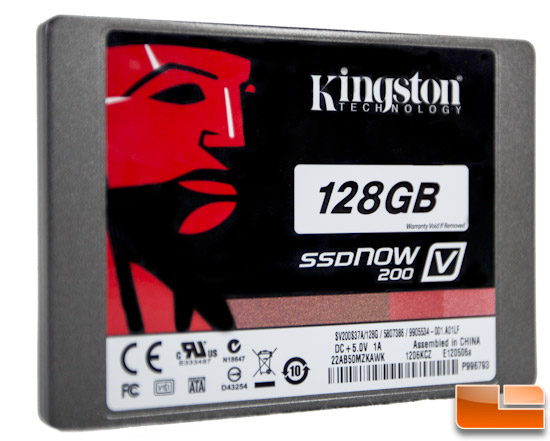Kingston SSDNow V200 128GB SSD Review
Final Thoughts & Conclusions
For the Kingston V200 128GB (1GB = 1,000,000,000 bytes) drive, the user has 119GB (actually expressed in GiB, 1GB = 1,073,741,824 bytes) available to them as shown in the drive properties within Windows. The difference is mostly the conversion of GB to GiB plus a bit of space set aside for overprovisioning that the controller uses to maintain the drive over time in an effort to mitigate performance degradation.

If you’ve read some of our SSD review articles, you may have picked up on something we’ve said numerous times which is that the real world feel of the fastest SSDs aren’t really all that discernibly different from the slower SSDs. Of course, this pertains to the average user. Power users who read/write large amounts of data often may see some difference in time spent waiting for these transactions to execute, but really unless compared side-by-side with another system, it’s hard to perceptively quantify. That said, the average user really doesn’t benefit a ton from spending big bucks on the latest and greatest SSD. They are better served getting a reliable and more affordable drive and/or spending the extra money on more capacity. At just $94 for the bare 128GB drive the cost per usable GB is just under $0.80. For $10 more, you can get the nice upgrade bundle (featured on the first page in this article) which is well worth the extra money if you can swing it.

So we’ve established that the V200 is indeed very affordable relative to some other SSDs of the same capacity on the market. As such, performance expectations should be in line with the price. While performance is not what we woudl call top notch, it’s certainly no slouch. In fact, Kingston has under-promised and over-delivered a bit, at least on the writes, which we saw consistently well above the promised 190MB/s. Reads were at or just below the 300MB/s mark which is not too shabby. Real world performance was just fine and we noticed no hiccups with the performance during normal use. Even though there still may be lingering perceptions of poor performance/stuttering with JMicron based controllers, there’s no evidence of that here and really, shouldn’t even be a concern as those types of issues were only seen with the very early generation controllers which have been much improved upon since then. However, every once and a while you’ll see someone bring it up on an online discussion board which perpetuates the fallacy.
Kingston put together a nice video to give everyone clear direction on how to migrate their OS to their new drive and if you check out their product page, they have a number of other videos as well. This is indicative of Kingston’s typical customer friendly approach and should you need it, the V200 is covered by a 3-year warranty and free tech support. On the subject of support, if you purchased one of these upon initial release, specifically the 64GB and 128GB versions, you’ll want to make sure you are running the latest firmware because Kingston claims the newest firmware brings increased performance. Per Kingston, “random write IOPS have increased 136 percent for the 64GB, and 129 percent for the 128GB”. They have a nice video of the firmware update process as well. Be aware that this is a destructive update so be sure to back up your data as the drive will be completely wiped.

Legit Bottom Line: Most users don’t need the best performance, nor do they want to pay top shelf prices. Kingston has a very nice offering for that crowd with the V200 line of SSDs that have respectable performance and affordable pricing.

Comments are closed.